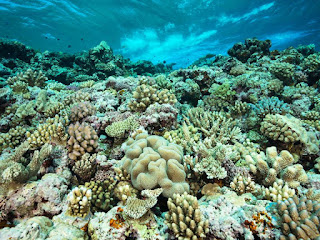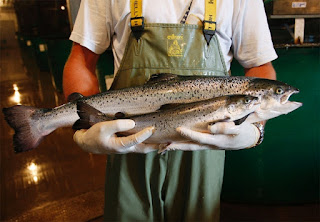1. Multiple Federal Agencies Concur: Climate Change will have a Drastic Impact
Since 1980, the average annual temperature in the U.S. has risen quickly and “recent decades have been the warmest of the past 1,500 years, according to a sweeping federal climate change report awaiting approval by the Trump administration.” The draft report is by scientists from 13 federal agencies. The report notes that thousands of studies by tens of thousands of scientists all report that human activities are primarily responsible for climate change. The National Academy of Sciences has signed off on the report.
Read More...
-----------------------------------------------
 Through a satellite tag tracking study, scientists have concluded that shortfin mako shark mortality rate is higher in the western North Atlantic than what fishermen report. "The tracking data also showed these mako sharks entered the management zones of 19 countries, underscoring how critical it is for countries to work together closely to manage and conserve these long-distance oceanic travelers."
Through a satellite tag tracking study, scientists have concluded that shortfin mako shark mortality rate is higher in the western North Atlantic than what fishermen report. "The tracking data also showed these mako sharks entered the management zones of 19 countries, underscoring how critical it is for countries to work together closely to manage and conserve these long-distance oceanic travelers."-----------------------------------------------
3. First Genetically Engineered Salmon Sold in Canada
After a 25 year wait, 4.5 tons of genetically engineered salmon has been sold in Canada. The Atlantic salmon is engineered to grow faster and reaches market in half the time (18 months) of non-genetically engineered salmon. Both the U.S. Food and Drug Administration and Canadian authorities have approved the salmon for sale, but neither country requires it to be labeled genetically engineered.
Read More...
-----------------------------------------------
4. How Will Animals React to the 2017 Solar Eclipse?
With the great American solar eclipse of August 21, 2017 on the way, many people are curious how animals will react to the total solar eclipse. Many animals awake during the day start their night time routine during totality. Daytime fish have been observed hiding during the eclipse while their night counterparts come out. Whales and dolphins have been observed at the surface 5 minutes before the eclipse and they stayed to watch until 5 minutes after the eclipse. Those who use the app iNaturalist can enter their own observations from before and after the eclipse, no matter where the eclipse is seen from.
5. Only 100 Companies Are Responsible for 71% of Global Emissions
 The Carbon Majors Reports states that only 100 companies are responsible for 71% of the world’s greenhouse gas emissions since 1988. This “pinpoints how a relatively small set of fossil fuel producers may hold the key to systemic change on carbon emissions. ExxonMobil, Shell, BP and Chevron are identified as among the highest emitting investor-owned companies since 1988.” Not all news is bad, as companies like Apple, Facebook and Google have committed to 100% renewable power.
Read More...
The Carbon Majors Reports states that only 100 companies are responsible for 71% of the world’s greenhouse gas emissions since 1988. This “pinpoints how a relatively small set of fossil fuel producers may hold the key to systemic change on carbon emissions. ExxonMobil, Shell, BP and Chevron are identified as among the highest emitting investor-owned companies since 1988.” Not all news is bad, as companies like Apple, Facebook and Google have committed to 100% renewable power.
Read More...
-----------------------------------------------
6. Genetically Engineering a Super Coral
 The Carbon Majors Reports states that only 100 companies are responsible for 71% of the world’s greenhouse gas emissions since 1988. This “pinpoints how a relatively small set of fossil fuel producers may hold the key to systemic change on carbon emissions. ExxonMobil, Shell, BP and Chevron are identified as among the highest emitting investor-owned companies since 1988.” Not all news is bad, as companies like Apple, Facebook and Google have committed to 100% renewable power.
The Carbon Majors Reports states that only 100 companies are responsible for 71% of the world’s greenhouse gas emissions since 1988. This “pinpoints how a relatively small set of fossil fuel producers may hold the key to systemic change on carbon emissions. ExxonMobil, Shell, BP and Chevron are identified as among the highest emitting investor-owned companies since 1988.” Not all news is bad, as companies like Apple, Facebook and Google have committed to 100% renewable power.-----------------------------------------------
6. Genetically Engineering a Super Coral

A scientist is looking into genetically engineering the algal symbionts that corals need to survive. Coral bleaching is a problem oceans-wide due to ocean temperatures rising. The Great Barrier Reef between 2014-2016 lost a quarter of their coral reefs. The scientist used a virus to deliver heat resistant genes to a symbiont. Whether or not this method gets used in a natural ecosystem remains to be seen, as its use will be very controversial.
-----------------------------------------------
7. Salmon in Danger of Losing Federal Protection
The Columbia-Snake River Irrigators Association is calling the cost of saving imperiled salmon in the largest river system in the Pacific Northwest unsustainable and is turning to the Trump administration to sidestep endangered species laws. The group is encouraged by recent Trump decisions that favor development over threatened and endangered animals. The irrigators association is frustrated with court rulings they believe favor fish over people and Trump could bring stability for irrigators, power generators and other businesses that rely on the water.
-----------------------------------------------
8. Grassroots Resistance and Low Oil Prices Stall Offshore Drilling
 North Carolina's Governor, Roy Cooper, announced his opposition to offshore drilling. He stated "It's clear that opening North Carolina's coast to oil and gas exploration and drilling would bring unacceptable risks to our economy, our environment and our coastal communities – and for little potential gain," Cooper said from Atlantic Beach, North Carolina. "As governor, I'm here to speak out and take action against it. I can sum it up in four words: not off our coast."
North Carolina's Governor, Roy Cooper, announced his opposition to offshore drilling. He stated "It's clear that opening North Carolina's coast to oil and gas exploration and drilling would bring unacceptable risks to our economy, our environment and our coastal communities – and for little potential gain," Cooper said from Atlantic Beach, North Carolina. "As governor, I'm here to speak out and take action against it. I can sum it up in four words: not off our coast."Read More...
Be sure to "LIKE" http://facebook.com/SeaSave to ensure our "Week in Review" is delivered to your newsfeed every Friday.
Sea Save Foundation is committed to raising awareness of marine conservation. The Week in Review is a team effort produced by the Sea Save staff to provide a weekly summary of the latest in marine research, policy, and news.



